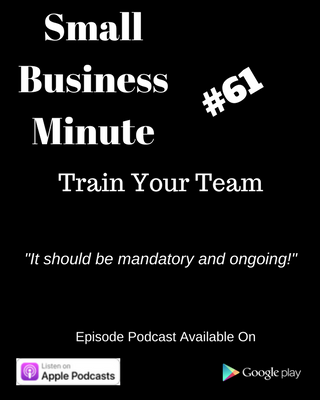Reading Time: 5 mins
We all have our own definitions of training for our team, but in all honesty, most of it sucks. Sure, for customer facing team members, we do the mandatory, how to acknowledge a customer stuff, with all the expected please and thank you’s.
It also goes without saying that we spend time teaching them “the system”, whether that be a retail POS or other software necessary to capture and order or process payment. Add to that the mandatory workplace safety and theft prevention training, we usually feel pretty good about our efforts.
This whole area of training, has been a sore point for me for quite some time and two situations minutes apart has made me want to revisit this topic. The extreme difference in the size of these two retailers served to reinforce how deficient product knowledge training is compared to the above mentioned items. One is a local franchise retailer whereas the other is part of a global department store chain.
Let’s begin with the local retailer. This is a specialty store whose main business is selling coffee pods and teas. Judging by the inventory, it would appear that the majority of their sales are Keurig pods. As we were looking for a specific brand of coffee we found on a recent trip, I used the opportunity to ask a couple questions regarding the availability, compatibility and difference between the original Keurig machine and the 2.0 machine. Theses are machines that they sell along with the coffee.
One in three
After and few hums and haws, the answer I received, and I paraphrase, was “I think so”. What made this so noteworthy was that another gentleman was in the store ahead of us and was asking some, what I thought, basic questions and the clerk was only able to answer one of his three questions.
Seriously, this is a specialty store and people were asking about the products in the store. Aside from basic pricing information and availability of some products, the individual had limited knowledge. As a specialty store, the staff should well versed on all products in the store. Why should a customer even bother to make a special trip to this store, when many of the brands they offer are available at the local grocery store?
The thing is, people usually frequent smaller stores in anticipation of receiving something, whether that be service or knowledge, not available at mass merchants and most will pay a small premium for it.
The sad part is, this is a store that I had been meaning to visit more than once and frankly I had expected more. Future trips, if any, will be very infrequent. What a missed opportunity.
Within 30 minutes of the previous experience, I headed to a major department store in search of some new luggage. My current bags had been run over once too often by airport baggage handling equipment and in dire need of replacement.
After spending 20 minutes in the department checking out their offerings a staff member finally showed up. With such a wide assortment of brands available, it’s difficult to determine which ones are quality versus value.
Looking for answers
As my interest was in purchasing a quality product that would last, I proceeded to ask the clerk which were the best brands for durability. She responded by saying Samsonite and Travelpro. So I asked why Travelpro? The answer I got was that they invented the roller wheels and that an airline pilot came up with the idea. It’s one of those replies that leaves you thinking, so?
My next question, was what makes them, Samsonite and Travelpro so good? Is the construction better? To which the respondent said they have a better warranty and yes, they’re better made. Again, it left me wondering how are they better made?
What I had expected was a little more in-depth answer along the lines of, they use a higher quality of materials or maybe they have greater structural support. This would have been an ideal time to show me the difference by opening comparable size items and point out the differences. But no, I was told that if I had any more questions that she would be right back!?
Clearly, this person had no idea what the product differentiators were and no doubt only sells based on price, or worse what the customer brought to the counter to purchase. The point is, I was fully prepared to purchase had I received the information I needed, but unfortunately, they were ill prepared.
Training should be mandatory and ongoing
Acquiring product knowledge is not difficult. The internet is a treasure trove of information on individual products and services. Better still, reach out to your suppliers and find out what they can do to help. Lunch and learn by manufacturer reps is just one way to get free training. Maybe the manufacturer has in-house data that they can share?
The point of all this is to say, that product knowledge training should carry, at minimum, equal weighting as processes. Taking the time to prioritize product knowledge and encouraging employees to do so on their own, will positively impact sales. The reality is that there are just too many alternatives in our hyper competitive environment, not to do so.
Yes, there has always been and always will be “tire kickers” who research products everywhere they can and then buy online or from a lower priced competitor. But that’s nothing new.
To counter that point, people are also very busy. Many just want to be served in a professional manner, by knowledgeable individuals. They are more than willing to buy from a company that will provide them the help and information they need to make an informed decision.
Training can be formal or informal, but it should be a priority, made mandatory and of course ongoing. Part of that training is to instill with the individual the desire to learn and explain the benefits of expanded knowledge, not just for the company but for the individual as well. People need to understand “what’s in it for them” and once they do, they’ll become self-motivated and everybody wins.
It’s no wonder the Amazon’s of the world are shipping more and more product everyday. Businesses of all sizes must realize that training is paramount, if they’re going to survive in this new age.
Copyright © Greg Weatherdon
Sign up above to receive email notification of the latest update to this blog.
Get More LIFE Out of Your Business
You shouldn’t be the hardest working person in your company.
Many small business owners find that even after the struggling start-up years, they’re working too many hours and still managing every aspect of their businesses.
Greg Weatherdon has been there, done that. As an entrepreneur, he learned not only how to get a business to the point of running smoothly, but also how to reduce the number of hours he worked, delegate more responsibility to his employees, and take longer vacations while his business chugged along like a well-oiled machine. And now he is providing the secret to success.
Do you suffer from any of the following?
1. Business ownership isn’t living up to the dream.
2. Endless workdays.
3. You can’t find good people.
4. Profits are less than expected.
5. You can never take a vacation.
You’re not alone. But there is a solution. As Greg demonstrates, with some time and effort, you really can Get More Life Out Of Your Business.




